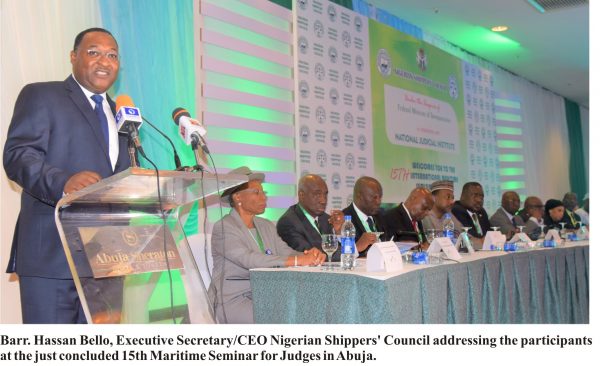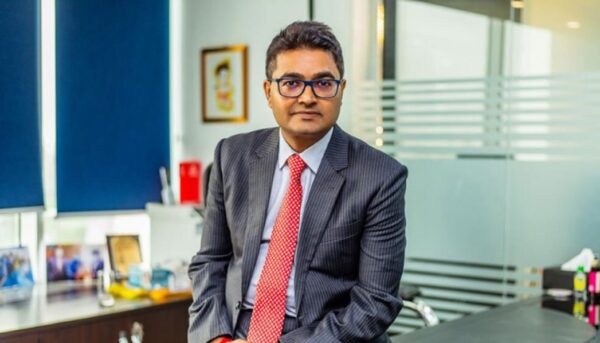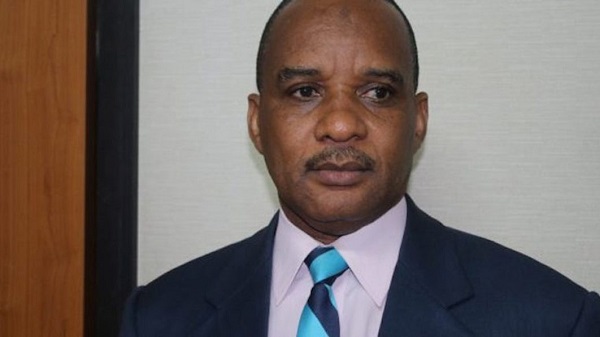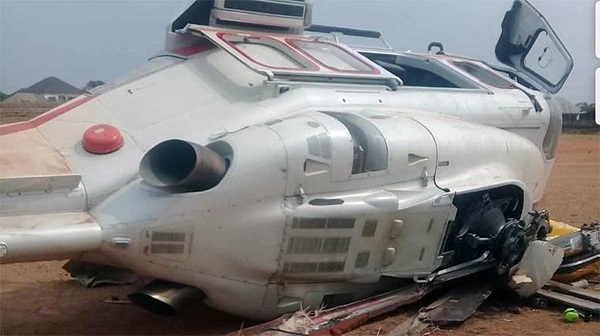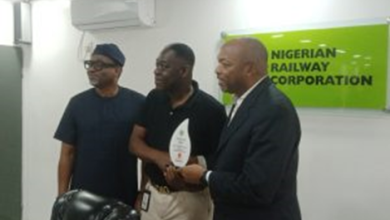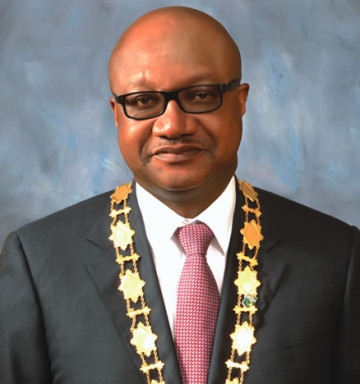Osibanjo Expands National Fleet Committee As Members Give Conditions
- FG to deploy technology for cargo tracking
- NPA slams 10days suspension on Maersk Line, 3 others
By Kenneth Jukpor
Following a statistically based impressive presentation at the presidency recently before the Vice President, Prof, Yemi Osibanjo on the need to give investment incentives and tax holidays to investors in national fleet, the Federal Government has expanded the national fleet implementation committee to include the Federal Ministry of Finance, Nigerian National Petroleum Corporation (NNPC), Nigerian Import and Export (NEXIM) Bank, Nigerian Investment Promotion Council (NIPC), Federal Ministry of Trade and Investment, PEBEC, and Nigerian Export Promotion Council (NEPC) and Presidential Enabling Business Environment Council (PEBEC).
The audience sought with the Vice president, according to the Chairman of the national fleet implementation committee, Barr. Hassan Bello was necessitated by the urgency to realize why both local and foreign investors have not shown up for the initiative, making a comparative analogy with factors that contributed to the success of the vessel fleet ownership and management in many countries.
The expanded committee has terse terms of reference of developing a template for the implementation of the national fleet.
Before the expansion of the committee, members of the committee were; Nigerian Shippers’ Council (NSC), Nigerian Ports Authority (NPA), Nigerian Maritime Administration and Safety Agency (NIMASA), Mrs. Mfon Usoro, Alhaji Tijani Ramallan and Engr. Olu Akinsoji.
Bello revealed that they had concluded plans to commence operations with five vessels, adding that the success of the project is premised on the tripod of dry cargo trade, regional cabotage and tanker trade.
“There are three aspects of the national fleet; the first is to have national trains to link the dry ports, we also need to have regional cabotage to boost trade among African countries and the last aspect is the tanker trade for crude oil supplies and wet cargo. These aspects are all onboard but we may not kick-off at once, we may start with regional Cabotage because the trade among African countries is very low and this shouldn’t be the case because there are lots of opportunities for trade” he said.
This development is coming three months after Pacific International Lines (PIL) pulled out of the agreement it signed with Nigeria for the establishment of a private sector-driven national fleet.
The Minister of Transportation, Hon. Rotimi Amaechi and the Executive Secretary of NSC Bello have however, expressed diverging views on PIL’s termination of the contract.
Pacific International Lines (PIL) had signed an agreement with Nigeria for the establishment of a private sector-driven national fleet with stake-holding of 60 to 40 percent between it and Nigerian investors.
While the Minister of Transportation attributed the impediment to the absence of indigenous operators with the requisite financial capacity, Shippers’ Council boss revealed that PIL baulked after realizing that Nigeria’s government wasn’t making financial commitment in the project.
“PIL were baffled by the fact that the government wasn’t putting its money even after they signed the MoU. They didn’t want to sign the contract when they realized it was fully a private investment. They had to go back and renegotiate among themselves and they later signed because we came all the way from Nigeria” he said.
Bello also added that there were other issues bothering on concessions to guarantee the sustainability of Nigeria’s national fleet. He noted that the development of insurance companies and the evolvement of banks in the country was crucial to the development of national fleet.
Recently, Nigeria’s Minister of Transportation, Hon. Rotimi Amaechi expressed doubt that the problem of vessel acquisition by indigenous players would end anytime soon, lamenting that indigenous ship-owners were unable to source 60% of the finance required to acquire vessels, despite his efforts to get PIL agree to provide the other 40%.
The Minister also lamented that his effort to get Nigerian ship-owners come together in order to pull resources and agree on the template for the disbursement of CVFF also failed, even as he pointed out the lacuna in requisite laws.
“As the Minister of Transport, I came in with a lot of enthusiasm about the sector, believing that we could create a better environment that would benefit the sector, stakeholders and the nation at large. I have realized that majority of the stakeholders in this sector only want free money. They say they want guarantee for cargoes but there is a law that says; give the opportunities to indigenous operators except in cases where they don’t have the capacity. I thought that after sourcing foreign investors, PIL, with 40%, we would have provided sufficient support to indigenous ship-owners but no ship-owner or group has been able to come with the 60%. I even set-up a committee to find out how they could raise that money but no result has come forward” Amaechi said.
Speaking to the media on the expanded committee last week, Bello added “There is an initiative by NIMASA which Shippers’ Council is involved in and NNPC is also changing the Free-On-Board (FOB) policy to Cost Insurance and Freight (CIF). Preliminary meetings have begun and a committee has been setup and Shippers’ Council is also a member of that committee” he said.
Hassan Bello expressed confidence that ship-owners and other operators would invest in the national fleet because the committee was going to package the initiative in such a way that they would want to invest in it.
“Once we have a national fleet, we would accord it the status of a national carrier according to NIMASA. The implication is that for the carriage of all cargoes coming to Nigeria, that carrier would have national priority for Federal Government, State Government and Local Government cargoes and this is substantial because all imported items for power, rail and other projects that would be carried via these ships. This agreement guarantees profitability for the investors. There are also other exemptions, in the past we didn’t pay duties on the ships that we import but we pay now. We want that waiver to be given to the ships in the national fleet”
“We have studied how the process is done in other countries where it is very liberal. This is because owning and maintaining a ship brings significant benefit to a nation’s economy. The freight to be earned would be spent here in Nigeria” he added.
Shippers’ Council boss also stressed the need to deploy technological initiatives to enable efficient tracking of cargoes in the country.
“Shipping lines are just waiting for the conclusion of the rail so that they can begin to issue true Bill of Laden and be able to track the cargo. The fear of Customs is the diversion of cargoes and that fear is well-founded. We have to develop initiatives to enable us track the cargo. We should be able to know from our offices when cargoes are being diverted.
“Cargo tracking is technological. We can put chips on the containers that cannot be removed and be able to monitor the container at anytime from a dashboard. Even if the truck stops, we should noticed that some movement is ongoing” he added.
On his part, the Chairman of Integrated Oil and Gas Limited, Capt. Emmanuel Iheanacho has admonished the Federal Government to be thoughtful in its bid to actualize a national fleet.
He noted that the nation’s investment in ships should reflect the structure and size of Nigeria’s trade.
“What is the structure of Nigeria’s trade? Crude oil shipping is happening all the time so we need to have container vessels. We need a pool of product tanker vessels and these are key elements that would determine whether or not your venture would succeed when you establish them” he said.
Meanwhile, in another development, NPA has meted out ten days suspension to the largest carrier in the country, Maersk Line as well as Cosco Shipping, APS, and Lansal as they failed to comply with the Authority’s directives on the use of holding bays.
The disobedience of these operators lead to pandemonium at the Lagos ports as truckers embarked on a strike over failure of the truck call-up system introduced to ease traffic congestion at the Lagos seaports.
Although the strike which lasted for about six days was called off on Thursday last week, after several meetings with Shippers’ Council, NPA and the Nigerian Navy and the truck owners, NPA has lived up-to its threat of sanctioning shipping lines and terminal operators who failed to comply with its directive to provide and use holding bays for their empty containers.
Speaking to MMS Plus on this development on Thursday last week, the Lagos State Vice Chairman, Dry Cargo Section of National Association of Road Transport Owners (NARTO), Alhaji Abdullahi Inuwa Mohammed said the group told their drivers to resume operations as it was in the best interest of the nation.
He lamented that the initial meeting with the regulatory agencies wasn’t attended by the core leaders of NARTO, hence, the attendees were unable to convince the truckers to begin operations.
“At the meeting, we were able to identify the problems as well as areas where we erred. The management of NPA promised to address some of the issues such as the holding bay and we had to plead with our drivers that returning to their jobs was in the interest of the nation” he said.
NPA said the decision to sanction the erring companies was part of efforts to resolve the protest by truck drivers at the Lagos Port Complex (LPC) and the Tin Can Island Port (TCIP) Lagos.
According to the statement issued by NPA on Friday last week, the sanction on the affected Shipping Companies; Maerskline, Cosco Shipping, APS and Lansal takes effect from Saturday, July 14th, 2018.
The Authority also stated that at the expiration of this suspension it would review the level of the compliance of the various companies to its directives.
According to the NPA, the misconducts of these companies contributed to the persistent congestion around the Lagos Port Complex (LPC) and the Tin Can Island Port (TCIP), spreading to other parts of the Lagos metropolis where truck drivers with no immediate business at the ports park their trucks on the express roads.

